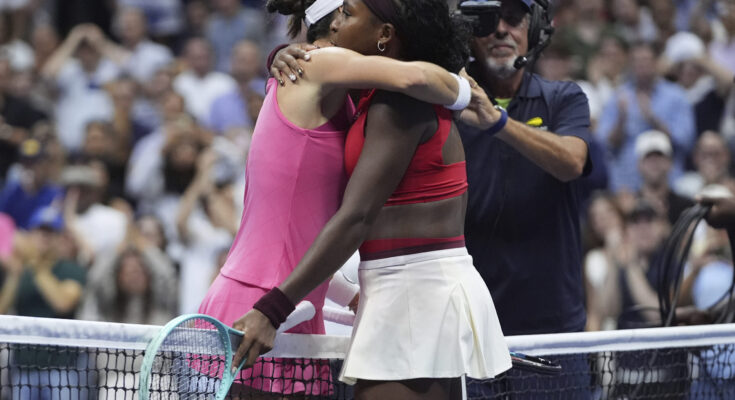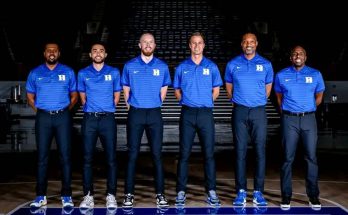Coco Gauff walked off the court at Arthur Ashe Stadium on opening day of the US Open with a broad smile, her fist still pumping in celebration. For the 20-year-old, winning the first match of a Grand Slam never gets old, and on this humid New York afternoon, she felt something deeper than relief—she felt both gratitude and belief. After a summer filled with questions about her form and the mounting expectations that inevitably follow her, Gauff’s performance in her opening-round win marked a reassuring start to a campaign where she knows every step will be scrutinized.
In her press conference afterward, she tried to describe the feeling of securing that all-important first victory. “It’s kind of like exhaling after holding your breath for so long,” she said. “The first match is always the hardest. No matter how many tournaments I’ve played, I always feel those butterflies walking onto the court here. Winning that first one makes me feel lighter, freer, and excited for what’s ahead.”
That sense of freedom has not always come easily for Gauff. Since bursting onto the scene as a 15-year-old prodigy defeating Venus Williams at Wimbledon, she has been cast as one of the sport’s brightest future champions. With that reputation comes pressure, and New York has often amplified it. In past US Opens, she has admitted to letting the noise seep into her mind—the chatter about her potential, the inevitable comparisons, and the weight of trying to deliver in front of a home crowd desperate for an American star to dominate.
This year, however, she insists things feel different. “I’m more at peace with myself now,” she said. “I don’t put everything on one match or one tournament anymore. I know my journey is bigger than that. But still, the US Open is special—it’s our home Slam. So to get a good start, it feels amazing.”
That good start was not entirely smooth. For the first few games, Gauff struggled to find rhythm. Her serve faltered, and her timing on the forehand looked a touch off. But she adjusted, showing patience and resilience—qualities that have become hallmarks of her game. As the match wore on, she began dictating rallies, using her athleticism to extend points and then finish with precision. By the final set, she was the version of herself fans love to see: fierce, confident, and commanding the biggest stage in tennis with the poise of a veteran.
When asked what was going through her mind during those early hiccups, Gauff admitted she had to quiet her inner critic. “The first match, you’re kind of testing the waters,” she explained. “I just told myself, ‘Okay, settle down. Play your game. Trust your shots.’ Once I started doing that, I felt like myself again.”
That word—“trust”—has been central to her growth. In tennis, trust in one’s game is fragile, often shaken by setbacks. But Gauff’s journey over the past year, including her landmark US Open title run last season, has strengthened her belief that she belongs at the top. While she remains grounded, she also embraces the responsibility of being seen as a leader of her generation.
“It’s a privilege, not a burden,” she said of the attention. “When I was younger, I think I tried to run from it. But now I see it differently. If people believe in me, it’s because they see something real. I’ve worked for this, and I’m proud of that. Winning today makes me feel like I’m on the right path again.”
Inside Arthur Ashe, the atmosphere mirrored her emotions. Fans chanted her name, waved flags, and roared with each point she won. Children wore shirts with her initials, a reminder of how much she inspires the next generation. After sealing match point, she turned to the crowd, clapping above her head in appreciation. “The energy here is unlike anywhere else,” she said. “It feels like the whole stadium is pushing you forward. That’s why winning here feels so good—it’s like we’re doing it together.”
Still, Gauff knows one win is just the beginning. The road through a Slam is grueling, and her ambitions extend far beyond simply advancing past the first round. But for now, she allowed herself to savor the moment. “It’s about building momentum,” she said. “But I also want to enjoy this. I think sometimes I’ve been so focused on the next thing that I forget to enjoy where I am. Right now, I’m just happy to be here, happy to win, and happy to keep going.”
Her words struck a balance between confidence and humility, a reflection of her maturity. At just 20, she has already lived through more scrutiny than many players experience in an entire career. Yet she carries it with a grace that belies her age. Coaches and analysts often remark on her professionalism, how she arrives at the practice courts prepared, listens intently to feedback, and continues to expand her game. That preparation showed in her ability to adapt mid-match today.
One of her coaches, speaking after the match, highlighted that quality. “Coco is learning how to solve problems on the court, and that’s the mark of a great player,” he said. “She doesn’t panic anymore. She works her way through challenges, and that’s why she was able to turn it around today. It’s not just about her skills—it’s about her mentality.”
That mentality is something Gauff herself has worked on deliberately. She has spoken openly about the mental toll the sport can take, especially for young athletes thrust into the spotlight. “I’ve had to learn to separate Coco the tennis player from Coco the person,” she said. “For a while, I thought my worth depended on winning. But now I know I’m more than that. Tennis is what I do, not who I am. That makes it easier to play with joy instead of fear.”
And joy was evident in her play, particularly as the match progressed. Her athleticism shone, as she slid into corners, retrieved impossible shots, and then countered with powerful winners. At one point, after chasing down a drop shot and flicking a forehand passing shot crosscourt, she grinned broadly, the kind of unfiltered smile that comes when the game feels fun again. The crowd erupted, sensing the shift not just in the scoreline but in her demeanor.
Looking ahead, Gauff remains cautious but optimistic. “Every match is a new challenge,” she said. “I respect all my opponents, and I know anything can happen in a Slam. But I feel good. I feel strong. And I feel like I have the tools to go far if I stay focused.”
Her fans certainly hope so. Social media buzzed after her win, with hashtags celebrating her victory and clips of her best shots spreading quickly. For many, Gauff represents more than a tennis player—she embodies hope, representation, and resilience. As one fan outside the stadium put it, “She makes you believe anything is possible. Watching her win here, it’s inspiring. You can feel her energy.”
That energy will be crucial as the tournament unfolds. The US Open is notorious for its unpredictable nature, with long matches, late-night battles, and the relentless pressure of the biggest stage. But for now, Gauff has given herself the best possible start: a first-round win, confidence restored, and a heart full of gratitude.
As she closed her press conference, she reflected once more on how she feels in this moment. “Honestly, I’m just happy,” she said. “Happy to be here, happy to play, happy to win. I think that’s the biggest thing for me right now—finding joy in the process. If I can keep that mindset, I believe great things will happen.”
For Coco Gauff, that first step at the US Open was more than just advancing in the draw. It was a reminder of why she plays, what she has learned, and how far she has come. The smile on her face as she waved to the New York crowd told the story better than any statistic could: relief, excitement, and an unshakable belief that this journey is only just beginning.



